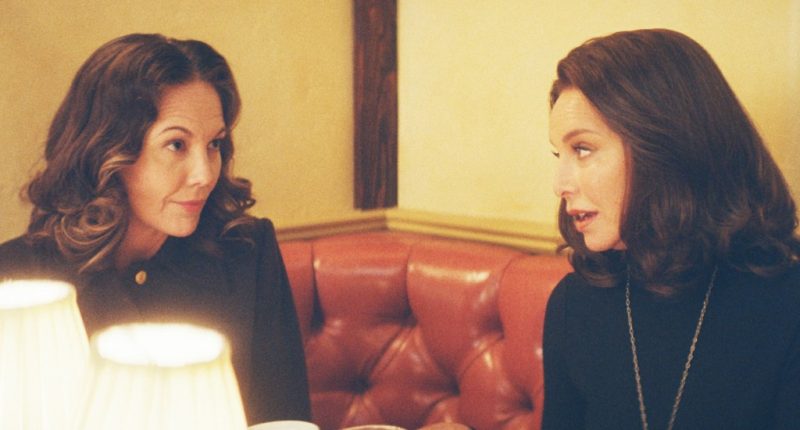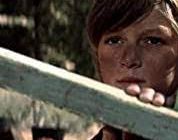[This story contains spoilers from the sixth episode of Feud: Capote vs. the Swans, “Hats, Gloves and Effete Homosexuals”]
Feud: Capote vs. the Swans is a reunion for Calista Flockhart and showrunner Jon Robin Baitz, who created Brothers & Sisters on which the actress starred during its five-season run. It was an instant yes, says Flockhart, when “Robbie” (as she calls him) and producer Ryan Murphy came to her with the role of Lee Radziwill in season two of the FX anthology — one of the coterie of New York City socialites with whom Truman Capote palled around (and later publicly fought) with in the 1960s and ’70s.
Radziwell was perhaps America’s best-known little sister; she was four years younger than Jackie Kennedy Onassis, who always overshadowed Lee despite her own efforts to achieve fame as an actress. But without the trappings of the official title of First Lady, Radziwill was able to flourish socially and was well-connected with the literary, artistic and cinematic worlds — and remained a fashion icon throughout her public life. Famously, she hired Albert and David Maysles to make a documentary about the Bouvier family, which introduced the documentarians to her aunt and cousin Edith Ewing Bouvier Beale and Edith Bouvier Beale, respectively, the infamous subjects of the Mayles’ seminal doc Grey Gardens. (This inspired the show’s third episode centered on Capote’s famous Black and White Ball.)
Within the world of Feud, however, Radziwill is at the top of the social circle in which she belongs, acting as a protector to Naomi Watts’ Babe Paley after Capote published an excerpt of his unfinished novel Answered Prayers — partially inspired by Paley and her marriage CBS CEO William Paley. As part of Team Babe, Radziwill ices Capote out of their close-knit circle and encourages his social ruin.
Flockhart spoke with THR about this week’s episode, which sees the decline of the high society figures in favor of the youthful counterculture, and detailed her research in preparing for the role, how she infused Radziwill’s complicated relationship with her sister into the character, and what the cohort of socialites might think about their contemporary counterparts on The Real Housewives franchises.
***
What was your reaction to the material when it first came to you?
I have to say, my very first reaction was: what a delicious and juicy scandal. And I discovered that it was also actually quite sad.
I know this is a reunion for you and showrunner Jon Robin Baitz, with whom you worked on Brothers & Sisters. Was it an exciting opportunity to work with him again?
Jon Robin Baitz, otherwise known as Robbie, is so smart and a wonderful piece of work. And the talent oozes from his pores. I’m serious about that. And I could say that sometimes, I could feel the way in which Robbie was using whatever qualities that he might see in me to sort of tailor Lee to me with a kind of matching specificity. Whenever I’m with Robbie, honestly, he just puts me into complete fits of giggles. He is one of the funniest people I know. And I have to ask him on occasion to dumb things down for me, so I can understand — he never holds it against me. He usually just talks more slowly and loudly until the little people can understand what the poet is saying. I adore him.
I assume you were familiar with Truman Capote, but did you know much about Lee or the Swans and this public feud?
I was not familiar at all [with the story]. I knew of Lee, and I knew she was a sister of Jackie Kennedy. And I vaguely knew that there was a complicated relationship between them.
Did you go back and read more about Lee to prepare?
When you play a real character, research becomes so vital and important. So that is what I did: I read everything I could get my hands on. I was able to find two interviews with Lee, but it was later in her life. But research was a really important part of my process.
As you said, when you play a real person, the stakes are pretty high. How did you physically embody Lee? Do hair and makeup and costumes help with that transition?
I had a great voice coach named Tom Jones, who is so incredibly talented. I discovered, with Tom, her voice, and then it’s a physical realization which is incredibly helped by the costumes and the wig and the makeup — then all of it comes together. Playing a real person, I do feel a bigger responsibility, because she was important to people. People who knew her, people who loved her, her family — they’re still here. There is a responsibility to get it right. But in this story, we are given a gift as a lot of it is through Truman Capote’s perception. I gathered all the information I could, and I really tried to focus on what people said about her, which was wildly different. Everybody had a different opinion of her, just like everybody else in the world. I tried to see how she related to people and friends, the people that she loved, and the people that she didn’t love. I sort of found my own emotional truth.
In this week’s episode, we see Truman in a very tender, emotional place. But Lee doesn’t necessarily see that, and some of the other Swans think she’s too hard on Truman — particularly when she refuses to defend him in his legal case with Gore Vidal. What was your perspective on that aspect of their relationship?
I found this episode to be particularly sad. To me, Lee is a person who is hurt when she feels rejected, and she’s in attack mode in this episode. I don’t know if I will ever know what the truth of the Gore Vidal situation was, but in my own head — for the actress part of me — I decided that it had to do with Jackie and Lee was maybe not allowed to get involved. Lee is also a person who — again, this is in my mind, this is the actress in me making this up because I don’t really know for sure — when she leaves the front door of her house, the mask goes on and the performance starts. When she’s sitting in La Côte Basque with Slim Keith (Diane Lane) and Truman is there with Kerry O’Shea (Ella Beatty), they’re both attacking Truman. And then Slim asks Lee about Peter Beard [the photographer whom Lee was seeing], and Lee immediately smiles. I just remember the scene very well: She’s painting a very dreamy picture of the situation, and I think it’s all bullshit. I think anything that comes out of Lee’s mouth is to paint a very pretty picture of a life that wasn’t so pretty. There’s a lot of emotional pain in her, but she covers it. She wants to fit in. She is in a clique, and she wants the clique to accept her. She wants to impress them. She’s a little bit of an outsider, even within that group.
You mentioned her complicated relationship with her sister, Jackie. How much of your motivation for the character came from that? You say she may have felt like an outsider — do you think it was because she was overshadowed by her sister?
I did think about that a lot. I think it speaks to the wounds that Lee was carrying around with her. I think it started when she was a child with her father, who favored Jackie right from the beginning. Someone once described them as frenemies — that made me laugh. But it was very complicated, as we know, and she carried that with her through her life. She was always trying to find her own identity. She took a stab at acting. She became an interior decorator. She was in high society in New York, and then, of course, the high society era came to an end.
This week’s episode also captures that era ending when Truman and C.Z. Guest go hat shopping and discover the hat store is closing, and later C.Z. and Babe Paley find out the gloves counter at a high-end department store has closed. But when I think of Lee, particularly in this show, she was very fashionable and forward-thinking — she knew how to survive the end of an era.
I 100 percent agree. She was the most progressive, the most ready to dig in and change. It was the ’60s — it was groovy, man. According to some people who told me this, Lee could drink a beer with the boys on the beach in a bathing suit, sitting in the sand. I’m not sure Babe Paley could have done that.
No, probably not. Lee seemed more willing to mix the high and lowbrow.
I think she absolutely could. I’m so happy that you noticed. She always wanted acceptance. She wanted approbation. She wanted love. She wanted to be seen. I always tried to let her flirt with the waiters. I’m not sure if it was ever really in the show, but I did it anyway.
The marketing for the show describes the Swans as “the original Housewives” — Lee’s daughter-in-law, Carole Radziwell, was a cast member of Real Housewives of New York for several seasons. I’m curious if you’re familiar with those shows, and what the Swans might think of the reality TV era we live in. Would they find the shows tacky and trashy? Or would they embrace them in an effort to own their own narratives and public personas?
That’s an interesting question and a smart, astute comparison. I haven’t seen any of the Real Housewives shows, but I have to say that since people have been talking about it in relation to Feud, I have been wanting to watch it and I think I will.
I can give you recommendations of where to start.
Please!
Well, season eight of Real Housewives of New York is one of the best — it’s got great drama overall. In season seven, Carole Radziwell’s arc is particularly interesting. But the best way to catch up is to watch the reunion episodes.
I think I’ll try that.
Speaking of Carole — I spoke to Diane Lane a few weeks ago, and she said she’d heard from people who knew Slim Keith, including Jane Fonda, who said she nailed the performance. Have you heard from anyone who knew Lee?
No — which means maybe I didn’t nail it! (laughs) I talked to many people who knew her, but later in life, which was a different time.
Did you know, or do you know, anyone who was a part of this milieu in New York at the time?
No, it was very much before my time! (laughs) I did think about my grandmother a lot. The long wig in the earlier episodes and the costumes just reminded me so much of her. My grandmother got up in the morning and she put on her stockings, her suit, her hat and her gloves. She always had her nails done. There was no leaving the house to go to the grocery store without being completely put together.
It’s so funny to think of this era as long-gone, but we’re not really that far from it ourselves.
I remember being young in New York, maybe a young teenager, and going to the theater — and we had to dress. Oh yeah. I remember that transition happening, when you could go to the theater in a pair of jeans and sneakers and sweatpants and it’d be fine. My family was Methodist; we went to church every Sunday when I was a child, and I had to put on stockings — I called them my pantyhose. They were very liberal, but I wore my pantyhose to church no matter what. I found that to be sad in the episode when, as we talked about it already, the hat store is going out of business and the glove department is gone — and old New York is lost.
Feud: Capote vs. the Swans releases new episodes on FX Wednesdays at 10 p.m., streaming the following day on Hulu
Also Read More: World News | Entertainment News | Celebrity News







